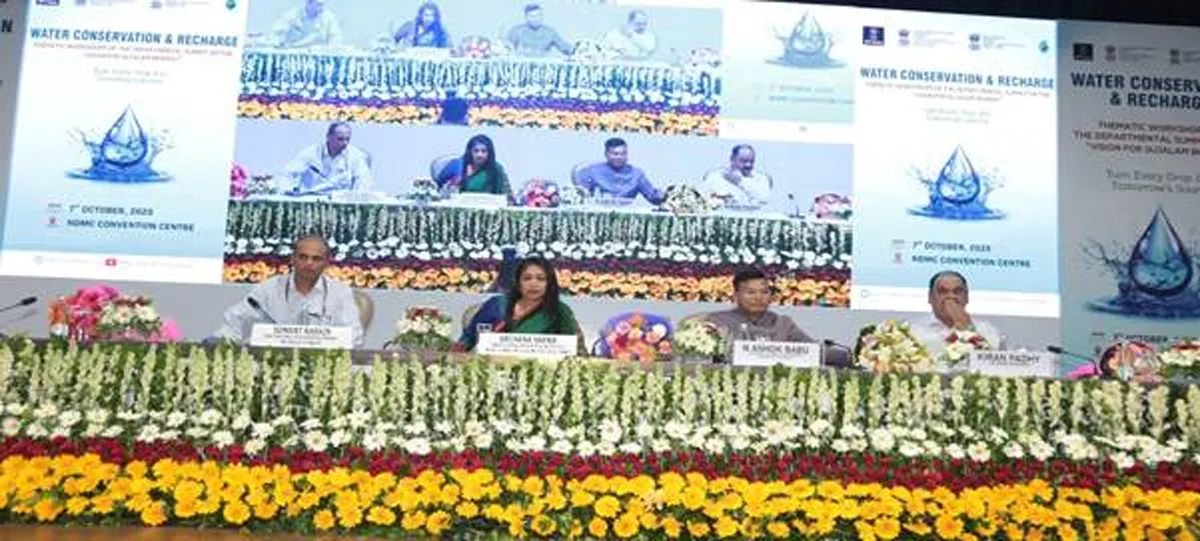As part of the preparatory thematic workshops leading up to the Departmental Summit on the Vision for Sujalam Bharat (scheduled for 28–29 November 2025), the National Water Mission (NWM) under the Ministry of Jal Shakti successfully conducted the 6th Thematic Workshop on ‘Water Conservation and Recharge’ at the NDMC Convention Centre, New Delhi.
The workshop, anchored in the vision outlined by Prime Minister Narendra Modi during the 4th Conference of Chief Secretaries, forms part of a series of six Departmental Summits in 2025 designed to encourage collaboration between central and state officers. Coordinated by NITI Aayog and chaired by Union Minister of Jal Shakti, Shri C. R. Patil, the upcoming Departmental Summit will focus on translating policy into action, fostering innovation, and reinforcing shared ownership in achieving the national goal of a Sujalam Bharat.
The workshop was attended by Ms Archana Varma, Additional Secretary and Mission Director, NWM, Mr Sumant Narain, Joint Secretary, NWM, senior officers from the Ministry of Rural Development, State Nodal Officers, CEOs, engineers, scientists, and representatives from Panchayati Raj Institutions (PRIs) of several states including Chhattisgarh, Andhra Pradesh, Madhya Pradesh, Tamil Nadu, Kerala, Maharashtra, and Gujarat. In total, around 275 delegates participated, reflecting a broad range of regional experiences and expertise in water management.
The event began with a Jal Kalash ceremony, symbolising India’s traditional reverence for water as a sacred resource. In her keynote address, Ms Varma highlighted the impact of climate change and the urgent need for sustainable water conservation to maintain ecological balance. She emphasised that the workshop brought together policymakers, scientists, engineers, and civil society to share grassroots innovations and best practices, ensuring an inclusive approach to securing India’s water future.
A presentation by the Joint Secretary, NWM, summarised outcomes from previous virtual workshops and discussed timelines for completing State-Specific Notes and Feedback Notes in line with NITI Aayog’s guidelines. He also underlined the recent amendments in Schedule I of MGNREGA, which strengthen the integration of water conservation efforts with rural employment and development.
Mr Kiran Padhy, Programme Officer, Ministry of Rural Development, delivered a presentation on Mahatma Gandhi NREGS, highlighting its role in promoting water conservation over the past 11 years and improving local water management through community participation.
State-level presentations showcased diverse innovations and successful models:
• Chhattisgarh: Ms Suruchi Singh, CEO, Zila Panchayat, shared GIS-based and community-driven approaches for water conservation.
• Andhra Pradesh: Mr Krishna Kumar Teja Mylavarapu, Commissioner, RD & PR, presented the shift to a centralised water conservation strategy integrating local best practices.
• Madhya Pradesh: Dr Nagarjuna B. Gonda, CEO, Zila Panchayat, discussed groundwater over-extraction and introduced the Jal Ghanana Samardhan Abhiyan to improve water governance through inter-departmental coordination.
• Tamil Nadu: Thiru J. Jayakanthan and Thiru S. Sridharan highlighted work on restoring irrigation tanks, addressing encroachments, and promoting fisheries.
• Kerala: Dr Binu Francis, Joint MD, Kerala Water Authority, spoke on managing rapid runoff, floods, and community-based water conservation.
• Gujarat: Mr Shreyash Gupta, OSD, presented micro-irrigation and supply-side interventions such as barrages and the Sujalam Sufalam Canal, addressing salinity ingress and introducing geomembrane farm ponds.
• Maharashtra: Dr Dilip Durbude and Mr Vishal Narwade discussed modern water conservation methods, demand–supply optimisation, and citizen-led initiatives under the LiFE (Lifestyle for Environment) programme.
Mr Bishwadeep Ghose, Country Director, Water for People, emphasised community-centric models, innovative technologies, and behaviour-change tools to promote sustainable rural water solutions.
An interactive feedback session concluded the workshop, consolidating insights and recommendations from participants. The outcomes will feed into the forthcoming Departmental Summit on Sujalam Bharat, helping shape a comprehensive roadmap for water security and resilience across India.
The workshop reaffirmed the Government of India’s commitment to Prime Minister Narendra Modi’s vision of Sujalam Bharat, underscoring that sustainable water management is not only a policy imperative but a national responsibility that requires collective participation to conserve and rejuvenate India’s vital water resources.





















